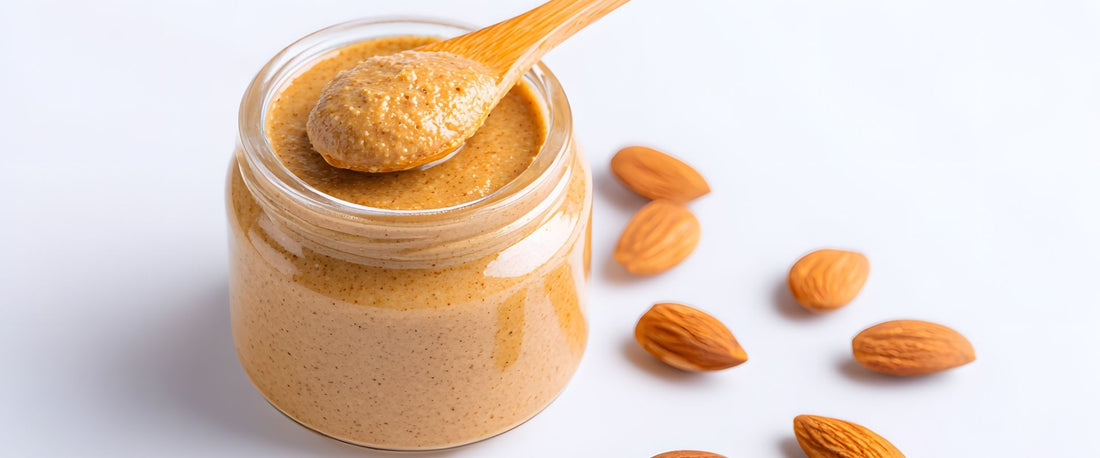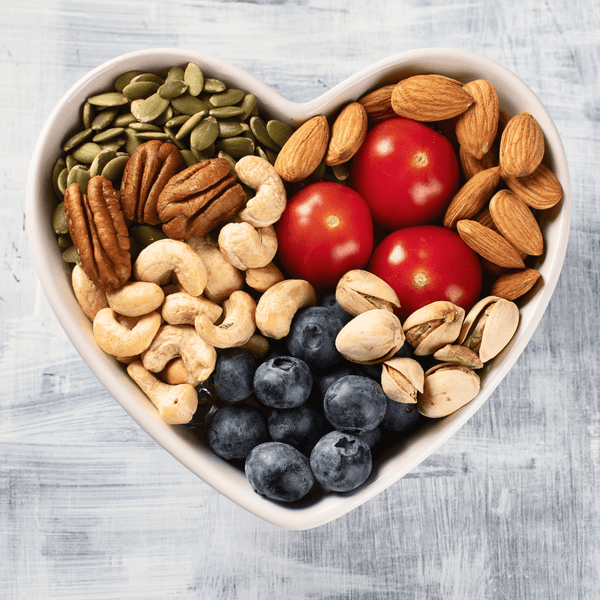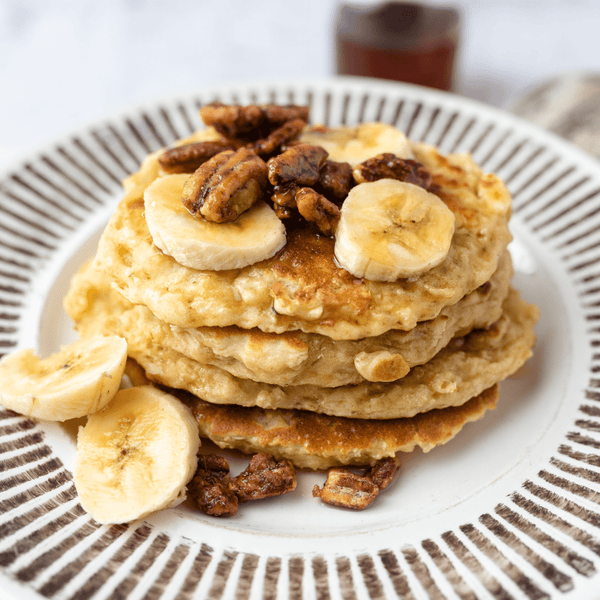You're standing in the nut butter aisle, jar in each hand, doing the classic grocery store shuffle.
Peanut butter? Almond butter? Cashew butter?
Your brain's probably asking: "Is almond butter actually healthier, or is this just another expensive health trend?"
You're not alone. With more people ditching processed snacks for cleaner options, nut butters have become the go-to for everything from post-workout fuel to midnight munchies.
But here's the thing, not all nut butters are created equal.
Almond butter has been getting serious buzz lately, and for good reason. It's creamy, versatile, and packed with nutrients that might surprise you.
In this guide, we'll break down everything you need to know: the real nutritional facts, whether it's actually good for weight loss, how it stacks up against peanut butter, and creative ways to enjoy it without derailing your health goals.
Ready to settle the almond butter debate once and for all? Let's dig in.
What Is Almond Butter?
Almond butter is exactly what it sounds like, ground almonds turned into a smooth, spreadable paste.
The process is surprisingly simple: whole almonds get ground down until their natural oils release, creating that creamy, rich texture we love. No dairy involved despite the name "butter."
You'll find several varieties on shelves today:
Raw almond butter uses unroasted almonds, giving it a milder, slightly sweet flavor and lighter color. Roasted versions offer a deeper, nuttier taste that many find more satisfying.
Then there's the texture debate: smooth (perfect for spreading) versus crunchy (with small almond pieces for extra texture).
Almond butter isn't exactly new, it's been around since the early 1900s. But its popularity exploded in the last decade as people started seeking alternatives to peanut butter, especially those with peanut allergies or following paleo diets.
Taste-wise, almond butter is less sweet than peanut butter, with a slightly earthy, rich flavor. The texture is typically thicker and less oily, though this varies by brand.
Some people describe it as more "sophisticated" than peanut butter, but honestly? It's just different, and that difference might be exactly what your taste buds (and health goals) are looking for.
Is Almond Butter Healthy? The Nutritional Breakdown
Let's cut straight to the numbers.
Two tablespoons of almond butter, the standard serving size, packs about 190 calories. That's not exactly a light snack, but those calories come loaded with nutrients.
Here's what you're getting:
- 16-18g of fat (mostly the good monounsaturated kind)
- 7g of protein to keep you satisfied
- 6-8g of carbs with 3g of fiber
The fat content might seem high, but it's the heart-healthy type that actually supports your metabolism and keeps you full longer.
Vitamin and mineral powerhouse: Almond butter delivers vitamin E (a powerful antioxidant), magnesium for muscle and nerve function, potassium for heart health, and calcium for bones. Plus iron, zinc, and folate.
The 3 grams of fiber help with digestion and blood sugar stability, something many processed snacks completely miss.
Now, here's the portion reality check: 190 calories can add up fast if you're not measuring. Ever tried to eat "just a little" almond butter straight from the jar? Yeah, we've all been there.
This is where mindful snacking comes in. At 100cal snacks, we've built portion control right into our products, like our 100-calorie protein bars that give you satisfaction without the guesswork. Sometimes the best approach to healthy snacking is having options that do the measuring for you.
Bottom line: almond butter is nutrient-dense, but portion awareness is key.
Is Almond Butter Good for Weight Loss?
Here's the surprising truth: yes, almond butter can support weight loss, if you're strategic about it.
The satiety factor is real. That combo of 7g protein, 3g fiber, and healthy fats works together to keep you full for hours. When you're satisfied, you're less likely to reach for processed snacks later.
Those monounsaturated fats aren't just filling, they actually support your metabolism and help your body absorb fat-soluble vitamins more effectively.
But let's be honest about the elephant in the room: portion control.
At 190 calories per serving, it's easy to accidentally eat 400+ calories if you're eyeballing portions. That spoonful-straight-from-the-jar habit? It can sabotage your goals fast.
Best timing for weight loss: Have almond butter with breakfast (on whole grain toast or in a smoothie) or as an afternoon snack with apple slices. The protein and fiber help stabilize blood sugar, preventing those energy crashes that lead to poor food choices.
The key is treating almond butter as a nutrient-dense addition, not a free-for-all snack.
This is exactly why we created our portion-controlled protein bars at 100cal snacks. Sometimes the smartest weight loss strategy is having satisfying, pre-portioned options that eliminate the guesswork, especially when willpower is running low.
Remember: almond butter can be your ally, but only if you respect the serving size.
Almond Butter for Diabetics: What You Need to Know
Good news for diabetics: almond butter can be a smart addition to your meal plan.
The Glycemic Index Advantage: Almond butter has a low glycemic index, meaning it won't spike your blood sugar the way refined carbs do. Those healthy fats, protein, and fiber work together to slow sugar absorption.
Blood Sugar Impact: When eaten alone, almond butter typically causes minimal blood sugar changes. The combination of protein (7g) and healthy fats helps stabilize glucose levels rather than creating dramatic peaks and valleys.
Portion Control is Critical: Stick to 1-2 tablespoons max. While almond butter won't spike blood sugar, it's still calorie-dense. Most diabetics can handle a 2-tablespoon serving without issues, but always monitor your individual response.
Best Timing: Have it with meals rather than alone. The protein and fat help blunt the glycemic response of other foods you're eating.
Smart pairings for blood sugar stability:
- Apple slices (the fiber combo is powerful)
- Celery sticks for a low-carb option
- Whole grain toast (choose high-fiber varieties)
- In smoothies with spinach and berries
Pro Tip: Always pair almond butter with fiber-rich foods. This combination slows digestion even further, giving you the most stable blood sugar response possible.
As always, work with your healthcare provider to see how almond butter fits your specific diabetes management plan.
Almond Butter vs. Peanut Butter: Which Is Healthier?
The age-old nut butter showdown. Let's settle this with facts, not food trends.
Nutritional face-off (2 tablespoons):
- Almond butter: 190 calories, 7g protein, 18g fat, 6g carbs, 3g fiber
- Peanut butter: 180 calories, 8g protein, 16g fat, 8g carbs, 2g fiber
Pretty close, right? But here's where almond butter pulls ahead:
Vitamin and Mineral Content: Almond butter delivers significantly more vitamin E, magnesium, and calcium. Peanut butter wins on niacin and has slightly more protein.
The Allergen Factor: This is huge. Tree nut allergies affect about 1% of people, while peanut allergies hit 1-2%. But peanuts are technically legumes, not nuts,so some people allergic to tree nuts can still enjoy peanut butter.
Taste and Texture: Peanut butter is sweeter and often smoother. Almond butter has an earthier, less sweet flavor and tends to be thicker. It's really about personal preference.
Your Wallet will Notice: Almond butter typically costs 2-3 times more than peanut butter. Quality peanut butter can be just as nutritious without the premium price tag.
When to Choose Almond Butter: If you want more vitamin E, magnesium, or have peanut allergies.
When Peanut Butter Wins: Budget-conscious shoppers, kids who prefer sweeter flavors, or when you need slightly more protein.
Honestly? Both are nutritious when you buy versions without added sugars or oils. The "healthier" choice depends on your specific needs, budget, and taste preferences.
Does Almond Butter Have Enough Protein?
Almond butter delivers 7 grams of protein per 2-tablespoon serving, that's decent, but let's put it in perspective.
Is it enough? For a snack, absolutely. That 7g can help bridge the gap between meals and keep you satisfied. But if you're relying on it as a primary protein source, you'll need to look elsewhere.
Also, almond butter provides incomplete protein, meaning it doesn't contain all nine essential amino acids your body needs. It's particularly low in lysine and methionine.
Most adults need 0.8-1g protein per kilogram of body weight daily. For a 150-pound person, that's about 55-68g total. So almond butter covers roughly 10-13% of daily needs per serving.
Smart protein-pairing strategies:
- Add it to Greek yogurt (complete protein boost)
- Spread on whole grain bread (amino acid complementing)
- Blend into protein smoothies
-
Pair with quinoa or hemp seeds
Think of almond butter as a protein contributor, not your main source. It's perfect for adding satisfying protein to snacks, but you'll want complete proteins like eggs, fish, or legumes to anchor your meals.
For snacking, that 7g is actually pretty solid, especially when paired thoughtfully.
What to Eat With Almond Butter: Creative & Healthy Ideas
Almond butter is incredibly versatile, way beyond the basic apple slice combo (though that's still a winner).
The classics that never get old:
- Apple or pear slices for natural sweetness and fiber
- Celery sticks for that satisfying crunch
- Whole grain toast topped with banana and a drizzle of honey
Creative pairings for every meal:
Breakfast: Swirl into oatmeal with berries, blend into smoothies with spinach and mango, or spread on rice cakes with sliced strawberries.
Lunch power-ups: Add a dollop to grain bowls, use as a creamy salad dressing base (thin with lemon juice), or stuff into dates for a sweet-savory bite.
Snack game-changers: Dark chocolate squares, rice crackers, or even a small spoonful with Greek yogurt and cinnamon.
Travel-friendly combos: Pre-cut apple bags, individual nut butter packets, or whole grain crackers. No refrigeration needed, and the protein keeps you satisfied during long flights or road trips.
Here's a smart pairing idea: Enjoy a small amount of almond butter with one of our 100cal snacks protein bars. The combination gives you different textures and flavors while keeping portions in check, perfect for when you want indulgence without overdoing it.
Quick recipe: Almond butter energy bites, mix 2 tbsp almond butter, 1/4 cup oats, 1 tbsp honey, and mini dark chocolate chips. Roll into balls and refrigerate.
The key? Balance almond butter's richness with fresh, fiber-rich foods.
Who Should Avoid Almond Butter?
While almond butter is healthy for most people, some should skip it entirely.
Tree nut allergies: This is non-negotiable. Even trace amounts can trigger serious reactions. Always read labels carefully, as almond butter is often processed in facilities with other allergens.
Very low-calorie diets: At 190 calories per serving, it can quickly eat up your daily allowance without providing enough volume to keep you satisfied.
Digestive sensitivities: Some people struggle with the high fat content, experiencing bloating or stomach discomfort. The fiber can also be problematic for those with IBS or similar conditions.
Blood-thinning medications: Almonds are high in vitamin E, which can enhance the effects of anticoagulant drugs like warfarin. Always check with your doctor first.
Severe calorie restrictions: If you're on a medically supervised very low-calorie diet, the dense calories might not fit your plan.
When in doubt, consult your healthcare provider,especially if you have food allergies, digestive issues, or take medications.
The Bottom Line: Is Almond Butter Worth the Hype?
Almond butter absolutely lives up to its reputation, when used smartly.
The verdict: It's packed with heart-healthy fats, quality protein, fiber, and essential nutrients like vitamin E and magnesium. For weight management, blood sugar stability, and overall nutrition, it's a solid choice that beats most processed snacks hands down.
But here's the reality check: Success comes down to portion control. Those 190 calories per serving add up fast, and it's easy to overdo it.
The key is treating almond butter as part of a balanced approach to healthy eating, not a free pass to indulgence.
Ready to snack smarter? Whether you're spreading almond butter on apple slices or reaching for a perfectly portioned protein bar, the goal is the same, nourishing your body without derailing your goals.
At 100cal snacks, we've made portion control effortless with our gut-friendly, protein-packed options. Sometimes the smartest snacking strategy combines the foods you love with the convenience you need.
Try it yourself! Make one small swap this week, choose nutrient-dense snacks that work with your lifestyle, not against it. Shop now and discover how easy healthy snacking can be.








